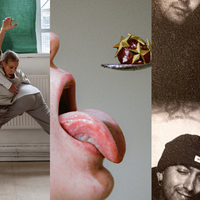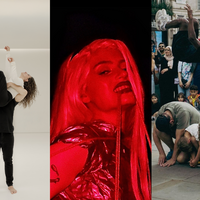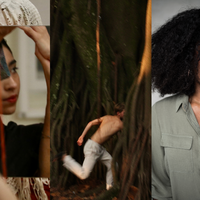Sat 15 Feb: Celine Celeesi, Olu Alatise and Juan Sánchez Plaza

News Story
Celine Celeesi Schlüsselkind
Olu Alatise Journal of 7
Juan Sánchez Plaza The Renegade Master
Please, no more voiceovers. But The Renegade Master, the night’s closing dance, begins with yet another. It’s full of lovely sentiments, “imagine a world where kindness is a currency”, but weighed down by cliché and platitudes. Thankfully, Juan Sánchez Plaza shifts gear, effacing the sanguine prophet with a cheeky, anarchic two-person dance. A huge patchwork larva hatches–among infamous soundbites (“Nobody respects women more than I do”)–into a twitching Trump caricature. It’s like a Punch cartoon at an acid rave. A blood-stained, crotch-retrieved US flag, pink leotards, techno twerking, rainbow pennants whirled defiantly after Trump’s “only two genders” line. Suddenly we’re standing, holding hands, waiting for the final beat drop. It’s trippy: much more–unrelenting energy, jolting transitions–and we might lose our minds. But a 20-minute microdose? The effect is ecstatic and mind-expanding.
Schlüsselkind’s blue lingerie-clad dancer prowls round a stage scattered with six plastic-tailed helium balloons hovering like haunting jellyfish. The English-German voiceover dominates Celine Celeesi’s solo dance: “I can’t sleep, I only dream.” Mixing alluring and ethereal movement sometimes achieves a creepy, off-kilter feeling. But the meandering monologue, without much movement or rhythm anchoring it, risks being sleepy not dreamy. Luckily the witty, seductive voice of the subconscious takes over, mocking hopeless efforts at self-improvement; Celeesi charges a balloon–each seemingly a memory, this a particularly traumatic one–as her subconscious screams not to. Engaging pacing, dark comedy, clever memory-balloon minefields, although utilised disappointingly little and late, thrill eventually.
Two heads nod down and snap back over a diary monologue about “high functioning depression”. The night’s opener starts shakily–sometimes struggling to captivate with limited numbers–but Journal of 7 excels with all 13 dancers involved. They pour in, a stomping, head-clutching, ragdoll-zombie army. Olu Alatise and AfroQueens Dance Company explore mental health, family tradition, Nigerian corruption–amazingly, not struggling with disjointedness. Punchy pace, engrossing scale, varied audio (intimidating synths, giddy Afrobeats, the Nigerian national anthem) all ease transitions. The all-female ensemble becomes a whirlwind of shouting mothers–“Too skinny!”; “Washed your hands?”–in an exciting, high-speed dinner table dance, an F1 pitstop with cutlery. Then, over newsreader snippets about Nigerian corruption, they’re violent police. Alatise balances levity and gravity deftly. To end, a pick-up-and-carry motion repeats–the burden-shouldering of history, trauma, anger–with intense exhalations becoming screams of rage, pain or both. A searingly powerful, ambitious piece which, simply put, deserves a full-length show.
Eddy Gibb
If you want to guarantee a standing ovation, it’s a good idea to end with an invocation to your audience to get on their feet and dance. In this way, the entire room was clapping along by the time Juan Sánchez Plaza’sThe Renegade Master brought this year’s Resolution Festival to a close.
Plaza and Isabel Alvarez Pinazo were by that point dressed in snazzy white jackets, lit with multi coloured bulbs, and twirling LGBTQIA+ flags in a moment of rousing hopefulness at the close of an essentially dark piece. It begins with the two performers hidden under a great bundle of clothes crawling slowly across the stage like some monstrous Leviathan while the soundtrack features Trumpian pronouncements.
Later they stand, swaying grotesquely, red light bathing the space. It’s earnest and heartfelt, telling us the world is a terrible place, but there’s not enough rigour or enough actual dance for it to grow as a communicative piece.
Journal of 7, which opened the evening, is also sombre in mood, but enlivened by fierce, sculpted dancing from 14 members of the AfroQueens, led by their founder and choreographer Olu Alatise. She opens the piece in a duet with another dancer, both hooded, their heads jerking backwards and forwards under rays of white light, while the voiceover talks of a battle with hidden depression.
As it progresses, different aspects of her life and her struggles are brought to life by scenes that show different forms of oppression – the suppression of protest, the urging to eat. The movement is strong and enticing, full of sharp chops of the arms and heavy stomps. It hadn’t been entirely adapted to work in the round, but it made an immense impact.
In between these two works, Celine Celeesi’sSchlüsselkind is a meditation on the fate of latchkey children, in which she drifts around the stage placing weighted balloons and posing carefully. More performance art than dance, it casts its own dreamy mood but feels strangely constricted. Like all three pieces, it uses a poetic, confessional voice track to make its points, when perhaps the steps could have carried more intent.
Sarah Crompton


